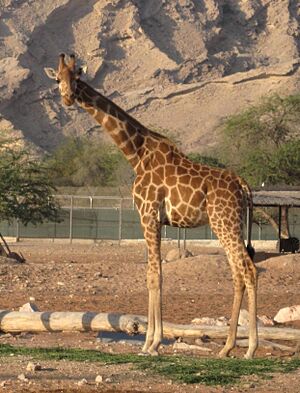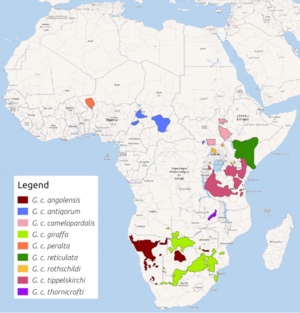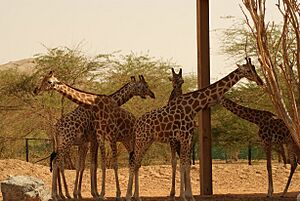Nubian giraffe facts for kids
Quick facts for kids Nubian giraffe |
|
|---|---|
 |
|
| A Nubian giraffe of the original phenotype at Al Ain Zoo in the United Arab Emirates | |
| Conservation status | |
| Scientific classification |
|
| Kingdom: | Animalia |
| Phylum: | Chordata |
| Class: | Mammalia |
| Order: | Artiodactyla |
| Family: | Giraffidae |
| Genus: | Giraffa |
| Species: | |
| Subspecies: |
G. c. camelopardalis
|
| Trinomial name | |
| Giraffa camelopardalis camelopardalis (Linnaeus, 1758)
|
|
 |
|
| Range in light pink | |
| Synonyms | |
|
G. c. rothschildi |
|
The Nubian giraffe is a type of giraffe found in parts of Africa. It's also called the Baringo giraffe or Ugandan giraffe. You can find them in countries like Ethiopia, Kenya, Uganda, South Sudan, and Sudan. Sadly, they no longer live in the wild in places like the Democratic Republic of the Congo, Egypt, and Eritrea.
These giraffes used to live across a much wider area in northeast Africa. In 2018, the IUCN listed the Nubian giraffe as Critically Endangered. This means they are at a very high risk of disappearing forever. Their numbers have dropped by 95% in the last 30 years.
Contents
Understanding Giraffe Families
Scientists use a system called taxonomy to group living things. The IUCN currently recognizes one main species of giraffe. Within this species, there are nine different types, called subspecies. The Nubian giraffe is one of these nine types.
The famous Swedish scientist Carl Linnaeus first described the giraffe in 1758. He gave it the scientific name Cervus camelopardalis. He found this giraffe in what is now Ethiopia or Sudan. Over the years, other scientists gave giraffes different names. However, these names are now considered to be for the same Nubian giraffe.
What Nubian Giraffes Look Like
The Nubian giraffe has special markings. They have clear, chestnut-colored spots. These spots are surrounded by mostly white lines. Their undersides, like their bellies, usually don't have any spots.
Male Nubian giraffes have a noticeable bump in the middle of their heads. A very cool thing about these giraffes is how long their front legs are. This gives them a huge stride when they walk or run. Even though they gallop slowly, they can reach speeds of up to 30 miles per hour!
Where Nubian Giraffes Live
Giraffes once lived all over Africa. The Nubian giraffe used to be found across North Africa, from Kenya all the way to Egypt. These amazing animals live in savannahs and woodlands.
Today, Nubian giraffes live in eastern South Sudan and southwestern Ethiopia. You can also find smaller groups in Uganda and Kenya. In 2016, experts estimated that about 2,150 Nubian giraffes lived in the wild. About 1,500 of these are a type called Rothschild's giraffe, which some scientists think is very similar to the Nubian giraffe.
Fewer than 200 Nubian giraffes now live in western Ethiopia. About 450 live in eastern South Sudan. There are around 800 in Kenya and more than 1,550 in Uganda.
Nubian Giraffes in Zoos

Many zoos around the world have giraffes. If the Rothschild's giraffe is considered the same as the Nubian giraffe, then this type is quite common in zoos. They are often seen alongside the reticulated giraffe.
However, if they are considered different, then the Al Ain Zoo in the United Arab Emirates is one of the few zoos that breeds pure Nubian giraffes. The Giza Zoo in Egypt also breeds Nubian giraffes.
See also
- Zarafa (giraffe), a famous Nubian giraffe given as a gift in 1827.
 | Janet Taylor Pickett |
 | Synthia Saint James |
 | Howardena Pindell |
 | Faith Ringgold |


